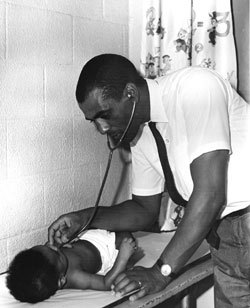
Since its beginning, the practice of medicine has been characterized by uncharted trails and the inspiring acts of fearless men and women, whose will to overcome challenges and setbacks have produced unimaginable triumphs.
Over many decades, the Detroit Medical Center (DMC) and its healthcare professionals have made significant contributions to medicine and Detroit’s African American presence is imprinted in every step of the journey from outsider to beneficiary to pioneer to leader.
Seventy-five years ago, DMC’s foundation institutions, Harper University Hospital, Children’s Hospital of Michigan and Hutzel Women’s Hospital, were already decades into serving the Detroit area community.
From its very beginning, Children’s Hospital cared for young patients of all races. But it was in the late 1940s that discussions about admitting Black medical residents began. And while history records a few African American physicians, nurses and other medical professionals at Children’s, Grace (Sinai-Grace) and Detroit Receiving Hospitals in the 1940s and ’50s, greater diversity would come in the 1960s when local African American physicians echoed the national call for equality and access.
Currently, Detroit Medical Center has one of the nation’s largest representations of African American physicians and executives in decision-making roles. In fact, in the last 75 years, DMC has become a reflection of the world’s many cultures, embracing physicians, patients, families and staff of every race and ethnicity.
Today, with its 10 hospitals and institutions, 2,000 licensed beds, 3,000 physicians and 12,000 full time employees, DMC continues to build on its legacy of triumph over trial and has broadened its designation as an industry leader, marking ground breaking territory in 21st century healthcare.
In this last decade:
DMC was an industry leader in its transition to system-wide Electronic Medical Record (EMR), now a centerpiece of patient safety and hospital quality, at all its hospitals.
It also stepped out front to advance the use of robotic medicine, and remote medical technology, making many procedures less invasive and closing the gap of time and distance between patient and physician.
Its adoption of the nation’s first 29 minute emergency room service guarantee, and more recently real time estimates on emergency room wait times, has received national recognition and patient applause.
The introduction of DMC’s Cardio Team One, the region’s first 24/7 on-site cardiology team, is also setting new response standards.
Breakthrough heart procedures are part of DMC’s legacy. Five decades ago, in 1952, the medical center made world news when an artificial heart designed by GM engineers working with physicians was used to perform the world’s first open heart surgery at Harper Hospital.
In nearly each decade, Detroit Medical Center has led advances that helped shape the healthcare industry.
In the 1980s, Detroit Receiving Hospital was Michigan’s first American College of Surgeons verified Level 1 Trauma Center and currently trains the majority of the state’s emergency physicians. In the early part of 2000, Receiving became the first center in the United States to use hyperbaric oxygen therapy to treat burns, wounds, smoke inhalation and other medical conditions. The therapy is now widely used with almost miraculous results.
Hutzel Women’s Hospital, founded nearly 140 years ago, is the state’s first and only hospital dedicated solely to the health needs of women. The National Institute of Child Health and Human Development’s decision to locate the nation’s first hospital-based Perinatology Research Branch at Hutzel, means ongoing research and advancement in the prevention of premature birth and infant mortality will be generated here, in Detroit, at the Detroit Medical Center, for the benefit of infants worldwide.
In the 1970s, DMC’s Rehabilitation Institute of Michigan (RIM) created the first driver re-training program for disabled people. Now approaching its 60th year, RIM is world renowned for its Center for Spinal Cord Injury Recovery and has restored hope and quality of life for victims of stroke, trauma and other injuries.
From research in artificial vision at Wayne State University’s Ligon Research Center of Vision at DMC’s Kresge Eye Institute, to a renowned Sports Medicine Program that serves the Detroit Pistons, Red Wings, Tigers and everyday athletes of all ages, to advanced pediatric medicine, women and infant care, emergency services, cardiac care family medicine and advanced research, the Detroit Medical Center’s next 75 years promise to be as groundbreaking as the last.
Just as importantly, DMC has helped set the tone for a new discussion on urban health care and how to support similar hospital systems that have traditionally cared for all who enter their doors.
But perhaps, DMC’s proudest accomplishment is its reputation as a trusted provider of quality healthcare for families and communities and as a partner in the growth and development of the region.
